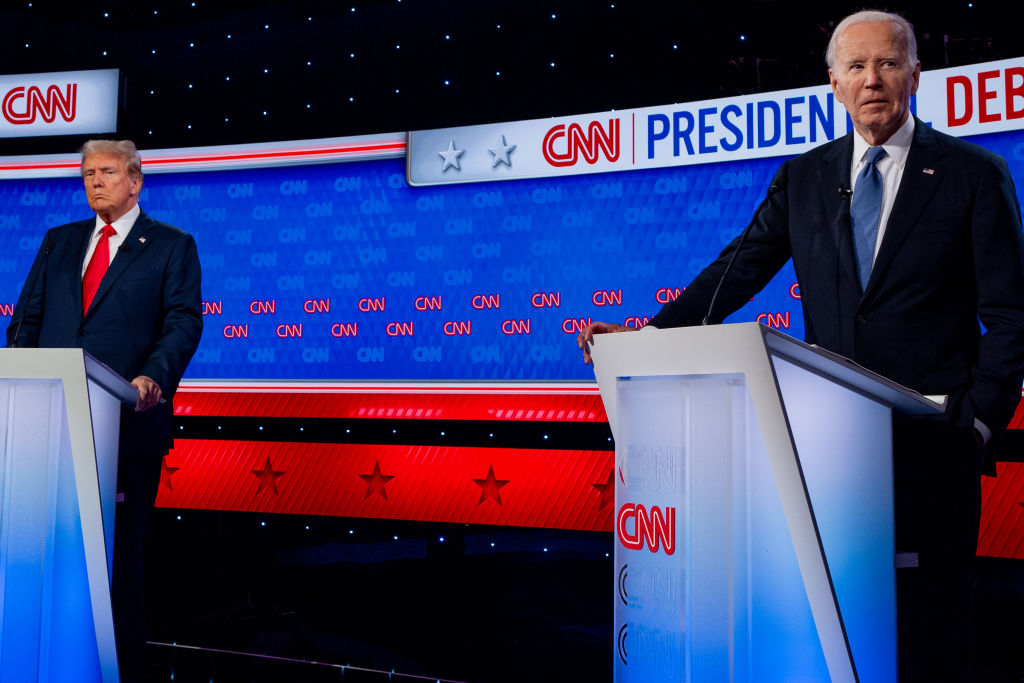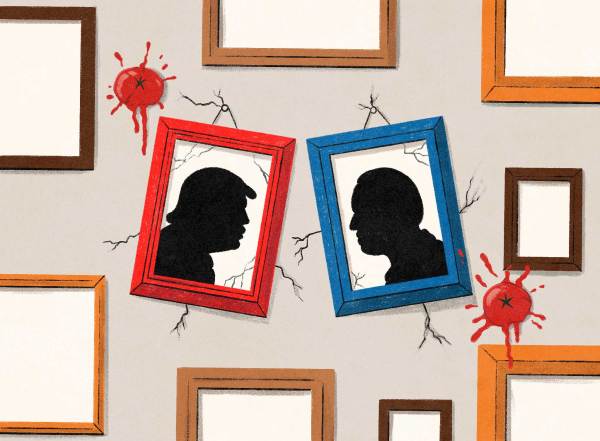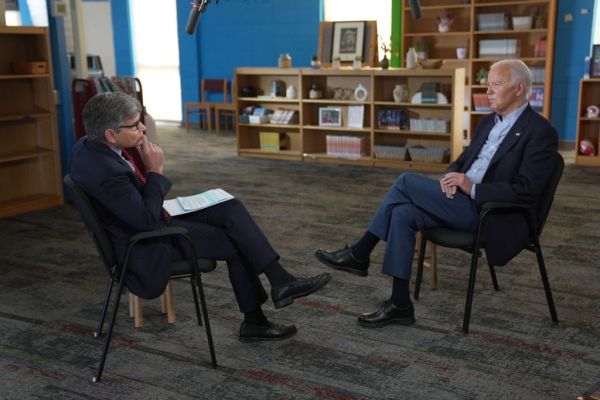As with many in my generation, I can measure time in memes. On a recent purge of my photos, I found a meme lampooning the race between Donald Trump and Joe Biden, who were, at the time, the sitting president and his presumptive opponent. The date in my camera roll: May 2018. I almost couldn’t believe my eyes. Is this really how long we’ve been doing this?
I’m still young enough that six years feels like a long time. When I first laughed at that meme and tucked it away for future use, I was finishing up my sophomore year in high school. I had just gotten my driver’s license. My biggest concern was preparing for the national tournament of my speech and debate league. Today, I’m a college graduate, soon moving to my first independent apartment to start law school. My fiancée and I are planning our wedding. And yet the current political moment has a certain Groundhog Day quality to it: I’m a different person than I was six years ago, but politics feels eerily the same.
For as long as I’ve been paying attention, I’ve been told to put my support and my vote behind the “lesser of two evils.” In the conservative Christian circles I grew up in—and which I still call my home—that naturally meant voting for Donald Trump. Sure, he was a liar and a narcissist. Sure, he was a philanderer. Sure, his religious ties were transactional at best. But he was the pro-life candidate, who would nominate pro-life judges, and maybe, just maybe, we would see the end of Roe v. Wade in our lifetime. I never quite bought that argument (though the latter part of it turned out to be even truer than its proponents realized).
Growing up, the people I respected always told me that the Republican Party was the party of principle and discipline. It was the party of originalism over judicial activism, faith over secularism, and family and country over shrill self-interest. So I watched in dismay and confusion as the party slowly but surely tilted toward Trump and then coalesced around him, someone who seemed closer to Hugh Hefner than William F. Buckley. At 15, I was still green enough to be shocked by the cognitive dissonance on display. Most of my diehard Republican friends were cognizant of Trump’s many foibles. But the pull of the “lesser of two evils” was strong.
In large part as a response to the perceived hypocrisy of the right, I went on my own sort of political odyssey in high school. By 2020 I had staked out a moderate-but-enthusiastic center-left position. After being a #YangGang diehard in the primaries, I voted for Joe Biden without much excitement but with conviction that he was the candidate best positioned to stymie a singularly dangerous threat to the institutions of American democracy.
The 2020 election and its immediate aftermath seemed to wholly vindicate this decision. Trump’s ham-fisted attempt to undermine and overthrow the election, culminating in the climactic episode of January 6, 2021, felt like something out of a #Resistance Lib fever dream. If Trump wanted to prove his critics right, he couldn’t have found a better way to do it.
However, when President Joe Biden, who ran as the “return-to-normality” candidate, declared he’d run for reelection despite growing signs of mental slippage, the cracks in the foundation started to show. My faith in the Democratic Party wavered, and then broke: How could they be so dishonest about tariffs? Or about the border? Or the Supreme Court? And above all, aren’t they seeing what the rest of us are seeing about Joe Biden? And when the dam burst on June 27, the night of the first presidential debate, Democrats showed themselves just as capable of sycophantic wagon-circling as the MAGA folks on the other side of the aisle.
There is a cruel sort of irony to the fact that each candidate has so clearly sold out on what was at one time the reason to hold-your-nose-and-vote for them. Trump has lost interest (if he ever had it) in a nationwide abortion ban and is determined to keep mifepristone available nationwide. The Republican Party, as well as Trump surrogates arguably led by now-vice presidential candidate J.D. Vance, have dutifully fallen in line, and in doing so have dealt a serious blow to the institutional pro-life movement and its effort to shift the Overton window post-Dobbs.
Meanwhile, on the other side of the aisle, it turns out that the “save democracy” candidate has spent months systematically concealing health issues that clearly affect his ability to lead the free world. Aided by a media establishment all too willing to turn a blind eye, Biden has left Democrats in the unenviable position of arguing that a shadow Cabinet ruling on behalf of an ineffectual figurehead is somehow the democratic option. Trump and Biden have each become what their respective supporters most feared: a social-conservative-in-name-only on the one hand, and a dishonest, power-hungry demagogue on the other.
These dynamics could, on some level, be justified on pragmatic terms. Republicans need to moderate on abortion, lest they lose the election. Biden has no suitable replacement waiting in the wings, even as calls for his withdrawal continue. But these excuses fail to remind us how we got here in the first place. We chose these options, and we chose them because we lacked the courage to try anything better. Republicans didn’t have to compromise on abortion until Trump’s capriciousness and political toxicity made it inevitable. The Democrats didn’t have to run a candidate fundamentally unfit to do the job until Biden’s narcissism, aided by opportunists on his staff, made the alternatives untenable. Like the weak servant in the Gospel of Matthew, we have buried our one coin for fear of losing it, and like him, we now risk losing even that small sum as the price for our cowardice. We have spent so long kowtowing that we have let these “lesser evils” cling to us and ultimately consume us.
Though this moment is bleak, it is not without hope. The recent assassination attempt against the former president serves as a stark reminder of the danger of catastrophizing. It has led to renewed calls for unity and a reduction in political vitriol from leaders of both parties. We can hope that the seriousness of the present moment reminds us that our integrity ought not be for sale. After all, the voice that demonizes and dehumanizes the opposition is the exact same one that says, “Vote for me, no matter the cost to your own values!” Now is the time for voters to reject this impoverished view of leadership, to reassert that character matters and that political compromise must always exist at the service of genuine goods.
No political party can hold our votes hostage merely by not being the other guys. Resistance to the temptation of the lesser evil may or may not be futile—but acquiescence to it will certainly be.






Please note that we at The Dispatch hold ourselves, our work, and our commenters to a higher standard than other places on the internet. We welcome comments that foster genuine debate or discussion—including comments critical of us or our work—but responses that include ad hominem attacks on fellow Dispatch members or are intended to stoke fear and anger may be moderated.
With your membership, you only have the ability to comment on The Morning Dispatch articles. Consider upgrading to join the conversation everywhere.